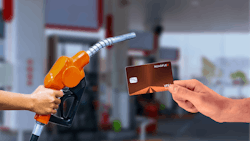Plumbing and mechanical contractors live in a world where the amount of business they get is often dependent on construction spending, which is up one season and down the next. When you never know when the next slump is coming or a project is going to be put on hold due to higher interest rates, every penny counts.
Fuel is an area that is full of opportunities for cost control. When you own company vehicles, your largest vehicle expense is likely fuel, which totals even more than the price of the vehicle itself. The way you purchase and manage that fuel can make that already-steep cost go up.
For instance, if you don’t have protocols in place to prevent, identify, and address fuel theft and misuse, you’re likely losing about 10-15% of your fuel budget to fraud according to industry averages. Likewise, if you or a member of your team are spending time tracking receipts, manually reconciling expenses, and reporting on fuel expenditures, you’re spending too much time (which, as we know, is money) on administrative tasks that could be better spent on marketing, bidding jobs, or billing clients.
If either of these scenarios apply to your business, you’re certainly not alone. Here’s the good news: fuel purchasing and fuel management technology has advanced to help you reduce fuel fraud and lower your fuel costs.
Even if you currently use or previously used a fuel card, those legacy cards have limited capabilities when it comes to transaction monitoring, spending controls, and security. The latest fuel cards on the market come with a fuel purchasing platform; this has paved the way for vast improvements in these areas as well as reporting and analytics that can yield cost-saving insights.
When I work with plumbing, mechanical, and other contractors, the following are what I call the five “need-to-know” features of modern construction fuel purchasing platforms.
Feature #1: Real-Time Transaction Monitoring
When you’re a contractor, it’s easy to lose oversight on fuel purchases for your company vehicles. You and your team have demanding schedules and I’m sure the last thing you want to do at the end of the day, week, or month is pore over fuel transactions for suspicious activity.
Plus, with legacy fuel cards, it typically takes two to three days before charges appear—that is, if you can even review them before you receive your statement at the end of the month. That gives fraudsters far too much time to spend your fuel dollars on their own purchases.
Next-generation fuel purchasing platforms remedy both issues by providing instant visibility into fuel purchases and using Artificial Intelligence (AI) to identify patterns and alert you about suspicious activity right away. This enables plumbing and mechanical contractors to track fuel expenses as they occur and take immediate action when the platform detects anomalies. The latest fuel purchasing platforms can also automatically block transactions that don’t meet the spending controls you’ve set.
This real-time oversight gives you tighter control over your fuel budget and prevents financial losses due to misuse.
Feature #2: Telematics and SMS Authentication
If you’re not familiar with telematics, they are devices you plug into your vehicles that gather all sorts of information about the status of the vehicle, including location, odometer readings, fuel tank capacity, and fuel gauge, amongst others.
Next-generation fuel purchasing platforms integrate with telematics location data to verify the vehicle, driver, and fuel card are all located at the same fueling location. This three-point verification prior to fuel purchases is a highly effective fuel fraud prevention strategy.
When the platform declines a transaction or detects suspicious activity, you can get an SMS (text) message or email alerting you to the issue.
Together, telematics and modern fuel risk management platforms offer a proactive approach to fuel security, help prevent theft, and ensure fuel is used for legitimate purposes—while also taking a significant amount of monitoring work off your to-do list.
Feature #3: Automated Expense Management
Managing traditional fuel cards can be time-consuming and complex, requiring manual reconciliation of transactions, tracking receipts, and processing financials, budget, and paperwork.
Modern fuel purchasing platforms simplify the process of reporting and reconciling fuel expenses, saving time and reducing administrative workload.
Today’s advanced platforms give contractors access to comprehensive reporting capabilities to make monitoring, reviewing, and reporting on fuel expenditures easy and accurate. These reports simplify other business tasks as well, like client invoicing and accounts receivable, tracking repairs and maintenance costs, employee oversight, financial planning, and spending analysis.
Additionally, modern fuel card platforms can automatically generate fuel tax reporting documents such as IFTA, free of charge.
Feature #4: Advanced Analytics Tools
Traditional fuel cards often lack detailed reporting and analytics features, making it challenging for business owners to analyze fuel consumption, track expenses, and identify cost-saving opportunities.
Today’s AI-powered fuel purchasing platforms use advanced analytical tools to give you valuable insights into spending patterns, which helps you reduce costs and operate more efficiently. For instance, if you notice a vehicle has been slowly increasing fuel consumption over time, that might indicate it needs maintenance or that the operating costs have become so high that it’s more cost effective to replace the vehicle.
With AI in play, fuel risk management platforms can analyze vast amounts of data quickly and accurately to find patterns and trends that aren’t apparent to the naked eye. With current technology at your disposal, you can get real-time insights into fuel purchases and anomalies that may indicate misuse or fraud. You can also easily create performance reports to benchmark and compare fuel spending by the driver or vehicle. These capabilities make it far easier to address issues before they become significant problems and find opportunities to improve efficiency and reduce costs.
AI also powers reports and dashboards that can provide a comprehensive view of fuel usage, helping you to see trends and areas for improvement. Legacy cards typically offer reporting on an account level, but modern-day fuel platforms offer reporting by vehicle, card, and driver. Platform users also have access to retroactive fuel analyses that compare how many gallons of fuel your vehicles consumed to miles driven to identify any potential fuel fraud.
Feature #5: Comprehensive Security Features
Fuel fraud is a very real possibility when you own company vehicles. In fact, 86% of vehicle managers believe fuel fraud currently takes place in their organization.
Modern fuel risk management platforms have comprehensive security features to protect against fuel card misuse and fraud.
Pre-setting spending limits by the card, driver, or vehicle is one such feature that helps prevent fuel fraud from happening in the first place.
With legacy cards, you could establish one limit for your entire fuel card account. That’s certainly better than having no control, but it doesn’t do much good if a thief goes on a spending spree and blows through the account limit using the stolen card. Now, you’ve lost one fuel card, but the ramifications don’t end there: you’ve also cut off purchases for the rest of your cards, preventing your team from purchasing fuel and crippling your business.
Modern-day fuel cards and platforms allow contractors to customize spending limits by cards, drivers, or vehicles. For instance, if a vehicle’s tank capacity is 15 gallons, you can set a limit that says the card can’t be used to purchase more than 15 gallons of fuel in an hour, day, or week.
Modern fuel risk management platforms also let users set up rules like the number of transactions in a day, the types of merchants and stores where they can be used, and the hours during which they can be used. Rules like these prevent cards from being used for purchases that aren’t business related.
Another layer of fraud protection is the ease with which stolen cards can be deactivated. If you have a legacy fuel card, it typically takes one to two business days to deactivate it. This can be disastrous when your fuel card is in the hands of a fraudster going on a spending spree. Even with spending controls in place, when a card is stolen, you don’t want to wait to deactivate it. With modern fuel cards, you can deactivate cards with just one click, in a matter of seconds.
SMS-based security offers yet another layer of protection for fuel cards. Every card is linked to a cell phone number and can only be unlocked for use following an SMS card unlock process.
A Proactive Approach Always Wins
Modern fuel risk management platforms let contractors be proactive, not reactive, about fuel purchasing, management, and security, while also reducing the administrative burden on you and your team. When a platform can make your life easier and reduce costs, it’s a win-win solution your company needs.
Rush Akin, Chief Revenue Officer, RoadFlex, is an experienced veteran in the fleet industry, with over 22+ years of experience in fleet management. Before joining RoadFlex, Rush served as the SVP of sales for Solera, where he was in charge of overseeing fleet sales and business development in North America. Prior to Solera, Rush worked with well-known brands in the industry, such as Rand McNally, Lytx, FourKytes, and Syntech Systems Fuel Master. Rush has a strong background in fleet and fuel management, as well as customer success.
About the Author
Rush Akin
Rush Akin is Chief Revenue Officer for RoadFlex. Rush is an experienced veteran in the fleet industry, with over 22+ years of experience in fleet management. Before joining RoadFlex, Rush served as the SVP of sales for Solera, where he was in charge of overseeing fleet sales and business development in North America. Prior to Solera, Rush worked with well-known brands in the industry, such as Rand McNally, Lytx, FourKytes, and Syntech Systems Fuel Master. Rush has a strong background in fleet and fuel management, as well as customer success.

